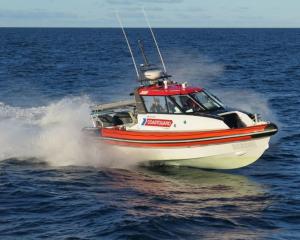Alliance group shareholders have given management the green light to investigate further the creation of a meat mega company.
Alliance Group chairman Owen Poole said yesterday that the Invercargill meat co-operative has a mandate from its shareholders to take its concept to the next stage, with discussions involving companies that could be part of the new entity planned for the next two to three weeks.
He also plans to meet Agriculture Minister Jim Anderton to inform him of the result of the meetings. "For all intents and purposes, we have a 100% mandate to go on,'' he said in an interview.
He has met with 1200 of the company's estimated 6000 shareholders in eight meetings throughout the South Island, with just one Nelson farmer voting against the concept.
Initial discussions with meat companies that could be part of the mega company were positive and they were receptive to the idea, Mr Poole said.
‘‘They're receptive. They all acknowledge our plan is good for farmers but they are trying to work out how they would fit into the model.
‘‘I have only been pleased with their attitude displayed so far.''
He hoped to have a clearer idea of their interest in the concept by later this month, or early next month, after discussions had taken place.
The timetable was tight to keep the concept on track for a 2009 start and allow a business plan to be developed to be taken to Government, farmers and companies.
The Alliance Group is proposing the merger of five meat companies, which would account for 80% of the procuring, processing and marketing of New Zealand meat exports.
Sheep farmers were experiencing their third successive year of low returns and many were leaving the industry, selling their farms to dairy farmers or converting to dairying themselves.
Mr Poole said having an entity with scale was the key to being a strong seller, to drive efficiency and to generate savings, estimated at $400 million a year, and to invest in marketing and market development programmes.
The North American Lamb Company, a marketing joint venture involving Alliance, PPCS and Anzco Foods, was the model for the new entity, he said, allowing the contributing exporters to consolidate and coordinate marketing and distribution of lamb and mutton in Canada and the United States under one entity.
A merger between Alliance and the other large cooperative, PPCS from Dunedin, would be the merger vehicle which could also include publicly-listed and privately owned meat companies.
Mr Poole said the response of those other companies and the resulting structure of the new entity would dictate how much new capital farmers would have to contribute.
Alliance has made some assumptions to give some broad detail to farmers, which indicates between $20,000 and $40,000 of new capital could be required.
Along with 80% market share, Mr Poole said other non-negotiable points were that an enlarged company would be farmer-owned and all parties must support the same strategic plan.
But any new entity also had to differ from the existing structure.
‘‘Sheep farmers are up against it and they need a circuit breaker,'' he said.
Incremental lamb price gains, which tended to follow cycles, were not adequate.
‘‘They need more and the industry needs a new platform,'' he said.
Mr Poole planned to talk to North Island farmers about the concept, but had not yet arranged the details of a speaking circuit.












